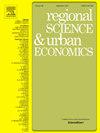空间重要吗?住房开支上限案例
IF 2.9
2区 经济学
Q1 ECONOMICS
引用次数: 0
摘要
在评估住房支出份额上限这一宏观审慎政策时,我们发现了空间建模的重要性。在空间模型中,均衡的特点是基于收入的空间排序,即家庭与自己收入类型的家庭竞争居住空间。因此,与不受限制的高收入家庭相比,上限政策会导致受限制的低收入家庭的住房需求下降更多,从而导致均衡房价下降更多。根据对家庭偏好的假设,在有空间模型中,这一机制导致的福利不平等的增加甚至适度减少要小于无空间模型。本文章由计算机程序翻译,如有差异,请以英文原文为准。
Does space matter? The case of the housing expenditure cap
In our evaluation of the housing expenditure share cap, a macroprudential policy, we discover the importance of modeling space. In a spatial model, the equilibrium features income-based spatial sorting where a household competes with households of their own income type for residential space. As a result, the cap policy causes a larger drop in housing demand, and consequently a larger reduction in equilibrium housing prices, for constrained low-income families than for unconstrained high-income families. Depending on the assumption on households’ preference, this mechanism leads to a smaller increase or even a modest decrease in welfare inequality in a spatial model than in a spaceless model.
求助全文
通过发布文献求助,成功后即可免费获取论文全文。
去求助
来源期刊

Regional Science and Urban Economics
Multiple-
CiteScore
5.30
自引率
9.70%
发文量
63
期刊介绍:
Regional Science and Urban Economics facilitates and encourages high-quality scholarship on important issues in regional and urban economics. It publishes significant contributions that are theoretical or empirical, positive or normative. It solicits original papers with a spatial dimension that can be of interest to economists. Empirical papers studying causal mechanisms are expected to propose a convincing identification strategy.
 求助内容:
求助内容: 应助结果提醒方式:
应助结果提醒方式:


